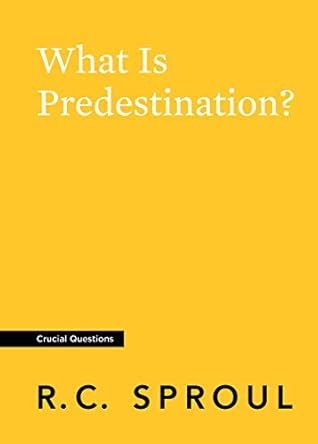- Bible
- Read the Bible
- Bible Versions
- Verse of the Day
- Reading Plans
- Verses by Topic
- Books of the Bible
- Bible Images
- Study
- Commentaries
- Concordances
- Dictionaries
- Encyclopedias
- Sermons
- Bible Atlas & Maps
- BP Wiki
- Devotionals
- Today's Devotionals
- Light of the World
- All Devotionals
- Inspirational Quotes
- More
- Picture Quotes
- Videos
- Inspirational
- Bible Study
- What The Bible Says
- Bible Q&As
- Daily Bread
- Bible by Genre
- Bible Stories
- Random Bible Verse
- Community
- Store
What Is Predestination? (Crucial Questions)
by R. C. Sproul
The Bible clearly teaches that we contribute nothing to our salvation. It is the gift of God (Eph. 2:8), and He alone saves. Yet many Christians bristle at this idea. If God decides who will believe, they reason, doesn’t that destroy free will? Isn’t it unfair to punish people who had no choice? In this booklet, Dr. R.C. Sproul clears up common misconceptions and distortions of the doctrine of predestination. Far from being fatalistic, this doctrine reveals the riches of God’s grace and brings comfort to our souls.
The Bible clearly teaches that we contribute nothing to our salvation. It is the gift of God (Eph. 2:8), and He alone saves. Yet many Christians bristle at this idea. If God decides who will believe, they reason, doesn’t that destroy free will? Isn’t it unfair to punish people who had no choice? In this booklet, Dr. R.C. Sproul clears up common misconceptions and distortions of the doctrine of predestination. Far from being fatalistic, this doctrine reveals the riches of God’s grace and brings comfort to our souls.The Crucial Questions booklet series by Dr. R.C. Sproul offers succinct answers to important questions often asked by Christians and thoughtful inquirers.
The Crucial Questions booklet series by Dr. R.C. Sproul offers succinct answers to important questions often asked by Christians and thoughtful inquirers.BUY NOW
Kindle Edition, 74 pages
Published October 28th 2019 by Reformation Trust Publishing
© 2025 Bibleportal.com All rights reserved.

Robert Charles Sproul was an American Reformed theologian and ordained pastor in the Presbyterian Church in America. He was the founder and chairman of Ligonier Ministries and could be heard daily on the Renewing Your Mind radio broadcast in the United States and internationally. Under Sproul's direction, Ligonier Ministries produced the Ligonier Statement on Biblical Inerrancy, which would eventually grow into the 1978 Chicago Statement on Biblical Inerrancy, of which Sproul, alongside Norman Geisler, was one of the chief architects. Sproul has been described as "the greatest and most influential proponent of the recovery of Reformed theology in the last century."
... Show more